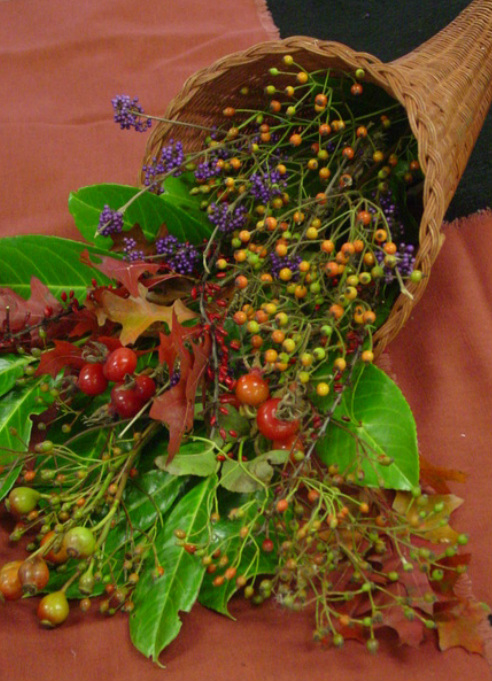Thanksgiving: Still Chewing  Leftovers are a tradition to rival the Thanksgiving feast and family gathering. Just how many turkey sandwiches and iterations of turkey soup can the family take? It’s a testimony to our abundance; in many ways we have more than we know what to do with. We enjoy remnants of the feast gone by (at least for the first meal or two) and savor the memories. I’m still chewing on giving thanks. My father-in-law surprised the family yesterday by asking for a summary of our year. I anticipated the need to identify something for which I was particularly grateful. But a summary of our year? How to collect the highs and lows of 365 days of experience into one statement. To complicate matters, lows seem to dominate our landscape lately . . . Our car developed a reluctance to start—and full diagnosis of the problem eludes our mechanic-friend. Our septic tank quit pumping to the leach field, filling dangerously full and beginning to smell. If needed, a new pump would be $1000; a new leach field could cost ten times that much. Driving home from work, I snacked on nuts from my lunch—and broke a tooth. Just the time for a trip to the dentist. Then I slipped off a step ladder and twisted my ankle. Following the immediate blinding pain, my ankle swelled and the side of my foot turned ghastly plum-purple. I’m partially incapacitated—but my work requires being on my feet . . . . . . and we’ve lost the cat’s electronic collar, and we’ve battled colds, and we’ve poured precious hours into design and communication with a client who put the entire job on hold, and . . . Paint all these problems against the backdrop of one of the most challenging years we’ve known. I’m as confident of the call of God as I’ve ever been—maybe more confident—but the doors for its fulfillment are closed. If my weaknesses could be collected into one place, they would make their home at my current workplace. If life were a river, mine would be the Cherith in drought-stricken Israel during the days of Elijah. Eventually even that brook dried up. So what to thank God for? Well, things could be worse. The car hasn’t entirely quit . . . the dentist was able to rebuild my broken tooth without an expensive crown . . . septic trouble was remedied without a new pump or leach field . . . I have a long weekend to rest my angry ankle.  That’s the way we often thank God. Most of the leaves of life are scattered by blasts of adversity, but we still cling to the tattered remains and through brave tears remind ourselves that things could be worse, that others are less fortunate, that out trials look small when compared with Job. Perspective is a good thing. It’s good to remember that we aren’t alone, that suffering is a part of the fabric of human existence, that God’s people are not exempted from trials. Peter brings this argument to bear with force: “. . . the same kinds of suffering are being experienced by your brotherhood throughout the world,” he encourages us (I Peter 5:9). When I stop to consider the anguish and pain of others, my own troubles appear smaller. There’s the family rocked by the earth-shaking loss of a beloved father and husband . . . the man who couldn’t find a job—of any kind—to support his tribe . . . the friends who lost their house because they couldn’t meet their bills. Then there are the distresses of those further from my sphere, but still within the circle Peter describes: our brotherhood throughout the world. Those who suffer persecution, imprisonment, and even torture under the heel of oppressive governments or at the hands of religious zealots. Those whose lives are daily in jeopardy. Those who have no septic tank to fail, no dentist to fix broken or infected teeth, no car to worry about. Makes my troubles look pretty small—and I can say, “Thank you, Father for your mercy—undeserved mercy. Things could be much worse.”  Sometimes we say thanks because the trial is over. The storm has moved on and we’re at peace. Our difficulty, inscrutable and insufferable in the middle, has passed. The pain is just a memory, part of a history that could have been a part of another life. “Thank you Father, for bringing me out of the terrible pit and setting my feet on the Rock.” James takes this tack as he considers suffering: “As an example of suffering and patience, brothers, take the prophets who spoke in the name of the Lord. Behold, we consider those blessed who remained steadfast. You have heard of the steadfastness of Job, and you have seen the purpose of the Lord, how the Lord is compassionate and merciful” (James 5:10–11). A story of high drama, great risk, and even terrible suffering is an adventure when seen in the rear-view mirror. That’s true even in the case of Job, as James points out. We know the end of the story: God was merciful and compassionate. Job arose from the pit of sorrow and pain and despair and ascended new heights of prosperity and plenty. And, because of the fire, he had a totally new understanding of God. “I had heard of you by the hearing of the ear, but now my eye sees you,” Job asserts (Job 42:5). The suspense of narrow escapes and the prestige of heroism is moving when we look back: but in the middle, it’s difficult—even impossible—to understand how it all adds up. That’s when Thanksgiving links arms with Faith, and together they sing at midnight in the jailhouse, giving praise to God: not just for how much worse off they could be or that pain is merely a memory . . . but because God counted them worthy to suffer. “Who knows the end? But we know God . . .” they shout against the darkness.  “God has the right to do with me whatever He pleases,” faith bolsters thanksgiving, “and whatever He pleases is right.” “Shall we receive good from God, and shall we not receive evil?” (Job 2:10). In the middle of our troubles, when every door is closed and there’s no way out—this is a time for thanking God. No, we don’t thank Him because we love suffering. We don’t thank Him because we would heap grief, like dust, on our tortured minds. We thank Him because our whole confidence is in Him. We know that He knows and we know that whatever He does is right. “This swollen, discolored, achy ankle, Lord—thank You that this is part of Your good purpose. Our unresolved car trouble, Father—thank You that You are working it out for good. And the inescapable reality of battered dreams—thank You that You are unmaking me to make something better, someone more like Your Son.” “It’s been a humbling year,” I answered my father-in-law, “and I still don’t like humility. But I do like grace . . .” I broke down as I explained some of what the year has meant to us and Melissa had to take up the refrain. Yes, here, in the middle I can thank God for grace. I can thank Him for hope that this night will pass, that joy will come in the morning. I can thank Him that my dried-up brook does not limit His ability to provide. I can thank Him that every loss paves the way for a better understanding of my God. “Faith, tune my soul to thank when my hands hold only broken pieces of dreams and hope goes out and my heart grows dull and listless. Tune my soul to thank when I don’t know what to do and when I wonder if it matters anyway. Tune my soul to thank . . .” “. . . to thank You, Father, because You always do what’s right.” © November 2011 by Robert G. Robbins
5 Comments
Nick and Kristine
11/25/2011 01:49:31 pm
"Faith bolsters thanksgiving". What a thought! I wonder if you could even say that backwards..."thanksgiving bolsters faith". Can't tell you just how many times I've felt so lost, overwhelmed, and faithless...yet led by the Spirit to give thanks - as if thankfulness was the latch key needed to open those doors and to boost my faith. Such a good word! We're certainly thankful for you guys!
Reply
Kelly Winfrey
11/25/2011 10:27:37 pm
Rob and Melissa: Thanks for the good words...for sharing from your brokenness the goodness of God. Your words are like cold water on a hot day. Refreshing. Healing. Comforting. Encouraging. So very good. Encourage one another daily lest any be hardened by the deceitfulness of sin. Thanks so much. Jesus bless you all. Kelly
Reply
Ann Janel
11/26/2011 01:39:12 am
"That’s when Thanksgiving links arms with Faith, and together they sing at midnight in the jailhouse, giving praise to God: not just for how much worse off they could be or that pain is merely a memory . . . but because God counted them worthy to suffer." Those words just jumped off the page (screen) at me. Thank you for your honesty and humility!
Reply
Diane Smit
11/28/2011 03:24:35 am
Right now my guy is struggling with pain like he's never known....that's a bad deal for a farmer! Your honesty is so refreshing...thanks. Please keep writing. Even if folks don't respond to you, they are listening and responding to the One that your life glorifies.
Reply
Randy Small
12/10/2011 02:11:11 pm
I have had this post sitting in Google Reader for a few weeks waiting for the right opportunity to read it.... and tonight I am encouraged by your words. Thank you for writing what the Spirit has laid on your heart.
Reply
Leave a Reply. |
Archives
October 2017
|

 RSS Feed
RSS Feed